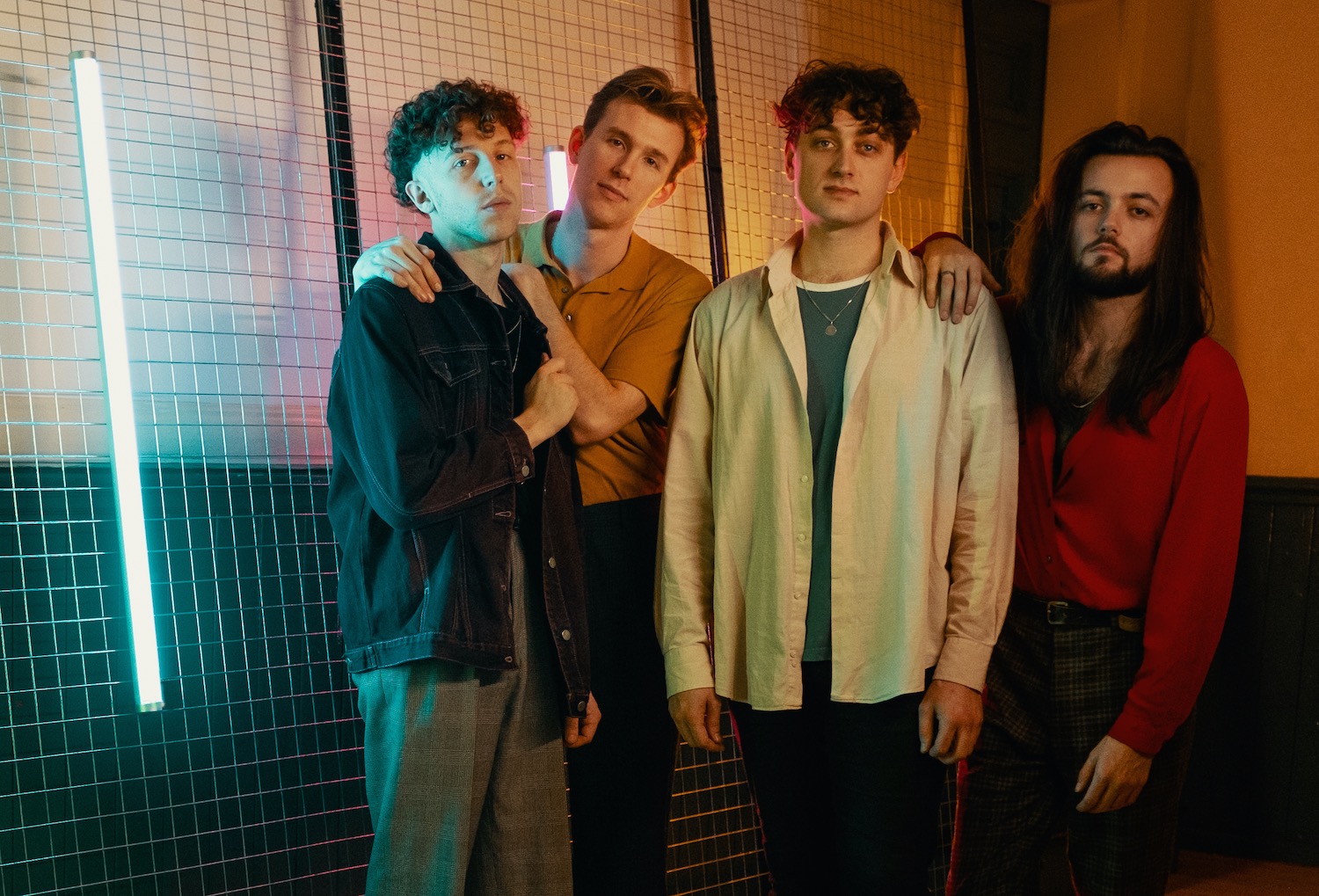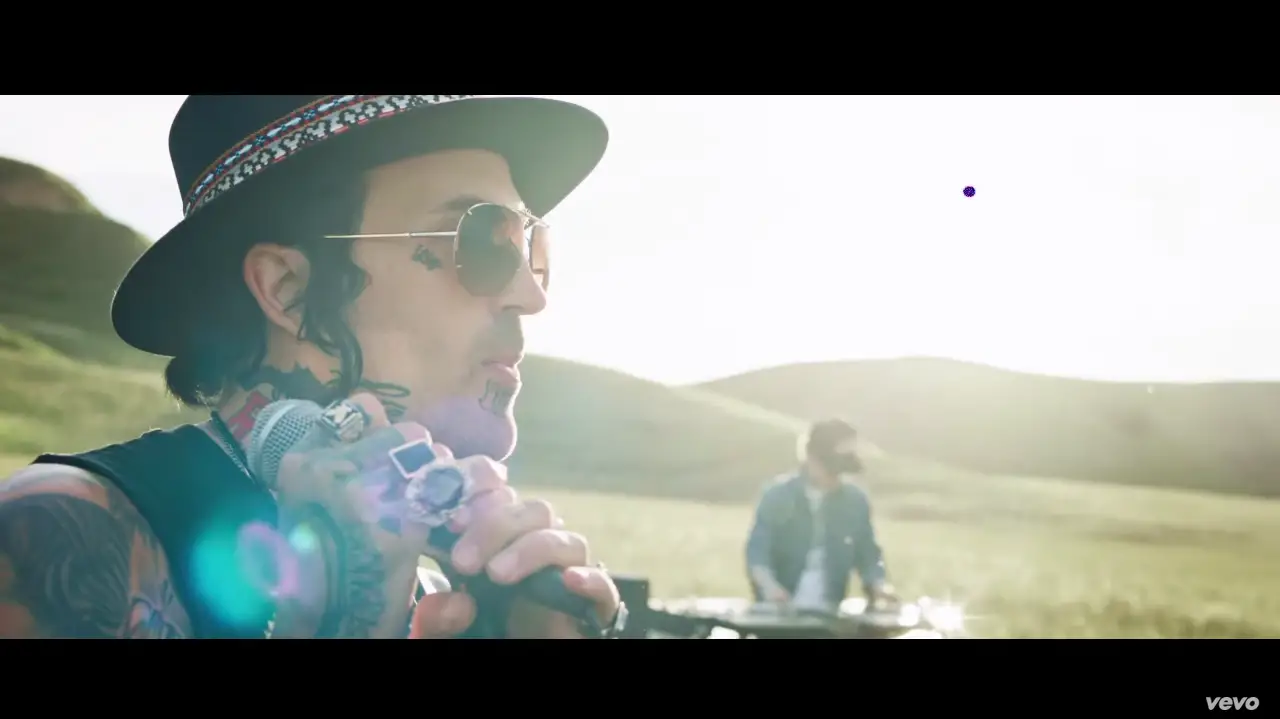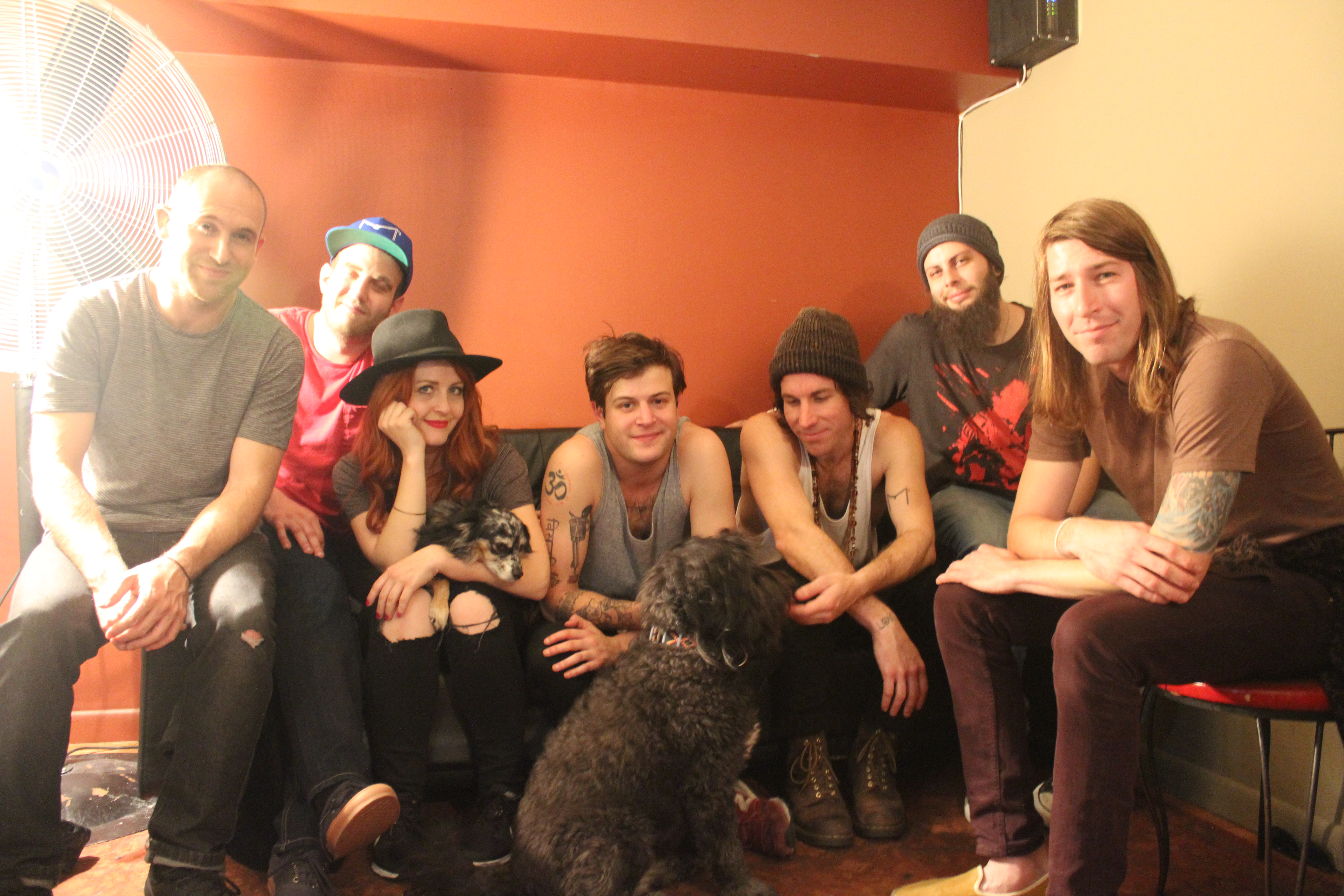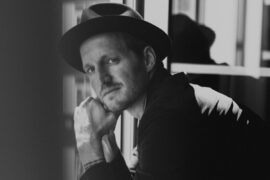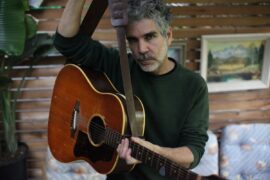New Zealand’s Yumi Zouma uncover the hardships of life and its ambiguities and uncertainties in their third studio album, ‘Truth or Consequences’.
Stream: ‘Truth or Consequences’ – Yumi Zouma
One of the hardest parts of growing up is realizing that not everything is black or white – that there’s always going to be a gray area, or something that will remain uncertain. As we navigate through life, applying this concept and many others we learn along the way to our own personal relationships may help us accept the ambiguities and realize we may never get the answer to our undying questions. Alternative pop band Yumi Zouma revel in these concepts on their third album, Truth or Consequences, released Friday, March 13 on Polyvinyl Records.

Originating from Christchurch, New Zealand, the four-piece band consists of Christie Simpson (vocals, keyboards), Josh Burgess (guitar, bass guitar, vocals, keyboards), Charlie Ryder (guitar, bass guitar, keyboards), and Olivia Campion (drums). Yumi Zouma’s first two records, Yoncalla (2016) and Willowbank (2017), received great reception from a growing fanbase, with tours following both albums. Constantly working and wanting to produce new material, the group have also released plenty of EPs and singles in between full-lengths, including the single, “Bruises” (2019).
Truth or Consequences greatly emphasizes the growth Yumi Zouma have had as a band over the past few years.
Christie Simpson’s ethereal vocals, the band’s dreamy pop melodies, and honest lyrics blend perfectly together and capture the Yumi Zouma sound. Songs like “Truer Than Ever” and “Lie Like You Want Me Back” dive into the complexities of life and this idea that answers may not be as clear as you want them to be. Each song questions the relationships we have and keep with others, and even the relationship we have with ourselves.
The writing process for this album in particular was quite different from the band’s previous works. All living in different locations, the band members became immune to writing songs individually and coming together later on to complete the process. When writing Truth or Consequences, all four bandmates rented out studios in various locations and started writing from scratch. As a result, the record revolves around a solid, central theme, and presents an easy, beautiful flow between each track.
Atwood Magazine spoke to Josh Burgess and Charlie Ryder about creating Yumi Zouma’s third album, the inspirations they drew from, and the bond they formed as a band while recording Truth or Consequences.
Being vulnerable, to me, is one of the most important parts you need to tap into for songwriting.
A CONVERSATION WITH YUMI ZOUMA
Atwood Magazine: Congratulations on your third album! What were your initial thoughts after its completion?
Josh Burgess: There’s a saying that goes, “perfect gets in the way of great” – there’s definitely an element where you have to say okay.. this is where it’s going to land. There’s also a sense of relief, in a way, like I’ve come to the end of the journey. I also felt happy. I remember thinking cool — this is just banger after banger on this record. I think Willowbank, the record before, had a few slower moments. In retrospect, they felt a little more indulgent, but I might say the same thing about Truth or Consequences in a few years. Did you feel relieved Charlie?
Charlie Ryder: Yeah, I think at the time I didn’t know what to feel but looking back at it, I feel really proud of what we’ve done. I think we when you just finish a record the songs are so new and you get caught up in the work you just did, you can’t really tell if it’s good or not. It takes some time to look back at all of it. I’m happy with it and I think it’s our best record yet.
Josh: When you’re in the depths of it, you trust your opinion to be your opinion, but what I’ve learned more about making music is other people’s opinions, or the press, is very far from what you think. Even other people’s music I’ll read reviews and think wow I took something completely different from it. I think that gives you a sense that your opinion or how you feel about a record is entirely your own – and you have to be content with that, and not think about anyone else’s perspective which sounds totally selfish but I think you have to in order to be sane.
Touching on the differences from Willowbank, how do you think this record compares to your previous albums and even EPs?
Josh: Looking back, especially on our EPs and on our first record, I feel like enough time has passed that I can understand its faults are the charm of it. It doesn’t mean that I want to make those mistakes again. It feels like a lineage – the comparison of it – I never go back and compare records because the distance between them and the route you’ve gone is more telling than a direct comparison. I think this is our best record, I genuinely do believe that and maybe that’s just because I’m in the moment, but I feel the four of us really hit a good synergy with songwriting that felt a lot more inclusive and complete than other records. I think this record more than ever, when I listen to an individual song, it’s so much harder to determine the bits of who’s contributed.
Charlie: More than anything, this record would be the one that’s definitely more Yumi Zouma sounding. Previously, it was a bit more all over the place and you could really hear the influences. I think it’s because we started from the blank sketch pad, and worked on everything harmoniously. It meant that no one had too much of an influence on one song. The songs in the end were very much of themselves and took on their own lives.

Do you think part of the reason why it sounds more cohesive would be due to the recording process? I know in the past you would write songs separately and then come together.
Josh: I think it’s because it has all those elements – writing together, producing a part. Writing is the part we prioritized being together for. It was less of people bringing ideas to the sessions, it was more like a blank canvas, like what kind of song are we going to write today?
Charlie: This record was quite fun because we did something we’ve never done which is go to Los Angeles and rent a studio and just sat there writing songs. For previous albums, the record was pretty much already written but this one was starting from scratch. That was a fun environment to be in. I thought writing in a studio would be a lot of pressure because of the rental of the studio means every minute is money – you’re really counting the clock. It was quite fun to just be there, hanging out with your friends, making music, not caring about what you make, not trying to make anything in particular and just seeing what comes out of it. My favorite songs have become the ones where you don’t really know what you’re aiming for.
Josh: We spent a lot of time on tour together in 2017, so I think a) we really entered that feeling of wanting to write since you don’t really get to write on tour, and b) the time together progressed down the path of feeling like you’re with family than it feels like work mates or bandmates. Spending this much time together encourages vulnerability together. They’ve all seen me at my worst, like being hangry because there’s nothing for a vegetarian to eat. I feel like it was nice to come out of that and into writing. Being vulnerable, to me, is one of the most important parts you need to tap into for songwriting. A lot of times when you’re writing, you know there’s this underlying feeling you’re trying to convey you don’t know exactly what it is, sometimes until maybe six months later when you finally finished the song. Having a lot of that concentrated time of hectic touring in 2017 really meant I had nothing to hide, so when it came to songwriting, they knew how crazy I was so it was easier to open up.
Did you know you’d write a third album after completing EP III? Did it come spontaneously after “Bruises,” or did you always know it would happen?
Josh: I think for us, we always like to be working on stuff. A really good analogy I heard from Ed Sheeran is when you turn on tap water, you have to let the dirty water go through until the pure water flows. I think that’s pretty true for Yumi Zouma – sometimes you have to push through the stuff that doesn’t feel that great. I would prefer to be trying something new than a better version of something you’ve already done, and I think a way to be on the track is just to be constantly working. While it’s rare that we sit down to talk about exactly what we want to do next, we all agree we want to keep on working and keep the train rolling.
Truth or Consequences really embodies the idea of “the gray area” – nothing is ever quite simple or clean cut. What drew you all toward that theme?
Josh: Life experiences. For me, personally, from 2016 onward, a lot of the stuff you saw socially and politically was really sobering in a sense that nothing is really clean cut or definitive. There are so many complex things about what makes people do and forms how people behave and forms how people think about things. That could go for many things like really wide – elections, Brexit, or stuff like that, but it could also be something very personal, like searching for absolute closure or an answer. Anyone who’s been through a breakup, you know, what you think about at the end of it, it’s very rare that there was one definite thing that caused it. Politically and socially, I was really drawn to that and it just fucked with my head a bit. The ambiguity of life is more terrifying than the definitive things in life.
The ambiguity of life is more terrifying than the definitive things in life.
The album opens up with “Lonely After,” a really great way to start the record. It has a beautiful opening which is sort of soft, and then it blossoms into the melody. Lyrically, Josh, you said it’s about that pit in your stomach where you start to question your identity. What was it like writing that song?
Josh: I’ve gone through a lot of career changes the past few years and I’ve started to think critically of what I wanted to do with my life. You almost feel a sense of embarrassment when you look back at this previous version of yourself who was so sure of what they wanted to do. It can be conflicting because you wanted to be one thing, and now it’s no longer your dream. What do you take from that? I just turned 30 recently and I think your 20s are a time of trial and error: Trying to be sure of who you are, but all you can do is be true to that voice inside of you. Sometimes it can be confronting, and you have to challenge that yourself.
You almost feel a sense of embarrassment when you look back at this previous version of yourself who was so sure of what they wanted to do.
“Mirror to the Fire” was a little bit different when I first listened to it, was that intentional?
Charlie: That song was very drawn out for us – it went through many different iterations. That might’ve been one of the first ones we wrote. It went through different styles–various pop versions, very dance heavy song, to a completely acoustic song. I think we had already gotten the album mixed and finalized, and then Christie suddenly said, “I really loved the old version of the song, can we please go back to it?”
Josh: Yeah, that song was really… sorry for beating this dead horse, but the song really brought up the ambiguity of everything. I think that’s a very important part of a creative exploration–always be questioning if that’s the direction you want to go. When I think of that song, I think about all the six or seven versions of that song (two of which will be on our limited edition Polyvinyl 7”). That song was definitely pulling teeth at times. I loved working with Charlie on this track because he’s the type of person who doesn’t think anything is done–you should always be looking for more creativity or more exploration. This song really embodies that.
“Cool For A Second” is a great single that got a lot of good reception, and one that was said to be a favorite for the band. What makes this song special for you?
Josh: One thing I found really special about it was Christie had to re-record some vocals and while she did it, she tweaked some of the lyrics. Knowing her personally and having talked to her about where she was at during that time, she perfectly articulated some of the stuff she was going through. There’s sort of this cool, out of body experience, where I can really hear Christie and that struggle she had.
Charlie: This song was a weird hodge-podge of ideas. When we wrote it, it was a very different song. I believe Josh came to my apartment and recorded vocals for a bridge, which ended up being the pre-chorus, and then we wrote the whole song around that pre-chorus. It wasn’t until we added guitars and synth is when it took on a new form of life. It went from being a song that probably wasn’t going to be on the record to the one the label liked the most. It also became a cool music video as well. We found a great director in Australia, Nick Mckk, that has done music videos we liked previously. We came up with an idea, Christie went to Australia and we had no idea it would turn out the way it did.
Josh: With this record especially, we found a coherent creative community; it’s been fun to have that much trust in that collaborative process. It’s important that your visual world aligns with your audio.
In regards to “Truer Than Ever,” Christie said she loved the duality in a lot of disco songs, where they’re incredibly upbeat, but there’s real frustration in the lyrics. Can you talk about the story behind writing this song?
Charlie: That was another song that ended up completely different. It went in a whole other direction. We have a version of that song that’s very rock, but we decided to go back to the original version. It’s a crazy song. It’s like, three or four songs combined into one. It’s definitely my favorite to play live.
Josh: When we were recording, actually, there’s a mic in the studio that we used to talk back to Christie who was recording in the booth, and we accidentally left it on so it captured the track through the monitor. A lot of this record, and in that moment in particular, we were just like, if it works, if it feels good sounds good, who cares? We weren’t striving to make something this pristine thing.
I thought this album was a bit different from your previous records in terms of production – the soft and comforting sounds were still there but it definitely seemed more upbeat. What was it like producing the album and working with Jake Aron?
Josh: Great–we’ve worked with him so much that we’ve established that creative language; we can work well together and understand each other. It always feels very collaborative.
Charlie: I think this was the point where I felt like he understood us and what we wanted. This is our second record together now, so he really understood the vision that we wanted. He was super easy to work with.
Did you have any musical inspirations going into writing this album? Whether that’s an artist, a genre, or something else you drew from?
Josh: Life around you is what inspires me. Songs have a gravitational pull if I hear them at a dance party or in the car with my girlfriend. I’m so consumed in what happens to us in the 75 years we get to spend on Earth, I have no time to be thinking about anything beyond this. Life is a gift. It’s such an inspirational and creative gift. I feel blessed to be alive and have a pretty easy life where I can explore being creative. I try not to take that for granted. Whenever I get down or annoyed at the process, I realize I must be really lucky if my biggest problem is this chorus not sounding right.
Charlie: I really feel like this album was the first time the inspiration was each other. It didn’t come from other bands. It was just a process of working together and very harmoniously.
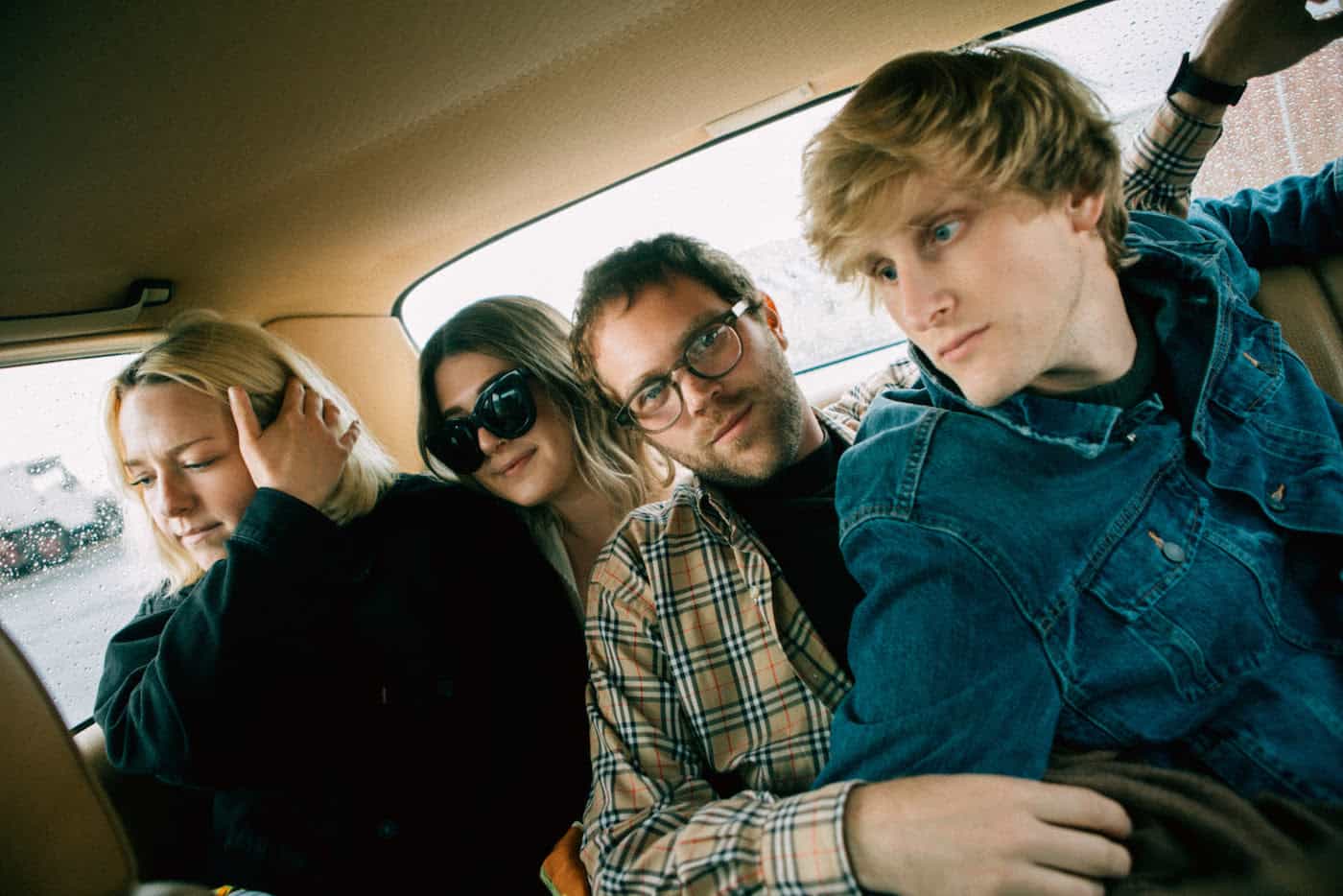
Was there a memorable moment in the studio while recording, whether that was a personal moment for one of you, or a moment you had altogether?
Charlie: When Christie wrote the chorus to “Sage,” it was like the best thing we’ve ever written in my life. What do you think, Josh?
Josh: There’s a saying where it’s like, making music is a flash of inspiration and the rest of problem solving. Problem solving as a team is so fulfilling–you feel superhuman because you arrive at conclusions you wouldn’t be able to by yourself. Ironically enough, which relates to the idea of always being creatively curious, I remember being in London writing the chorus “Right Track/Wrong Man.” We ended up scraping away this chorus, but I remember at the time having the elation of “this is it,”–this is what we were searching for and finding the answer we were looking for that keeps this feeling going. It’s about finding those little instances that help you get to that feeling.
With so many new and different approaches you took with this album, what do you think the future holds for Yumi Zouma?
Josh: I think we’re always wondering what we can do that will get us out of our comfort zone and just the right amount, so we can have some new, creative takes. I think I tried to let go a lot more ego than previously, and just let the best idea win. I was hypocritical of ever feeling like I was favoring my own ideas over better ones–and that’s uncomfortable for me. There’s that desire to always want to have your stamp on everything.
Charlie: I think we would be open to working collaborating with people on the audio side, different producers, or maybe a live studio album.
— —
:: stream/purchase Truth or Consequences here ::
— — — —

Connect to Yumi Zouma on
Facebook, Twitter, Instagram
Discover new music on Atwood Magazine
? © Jack Sheppard
Truth or Consequences
an album by Yumi Zouma


